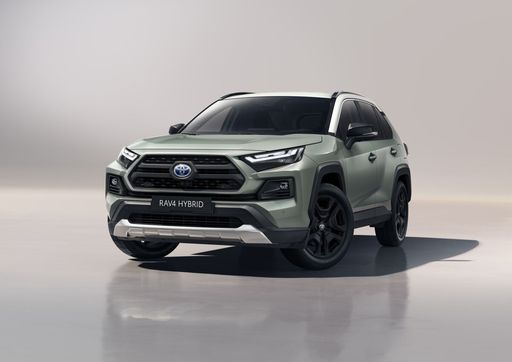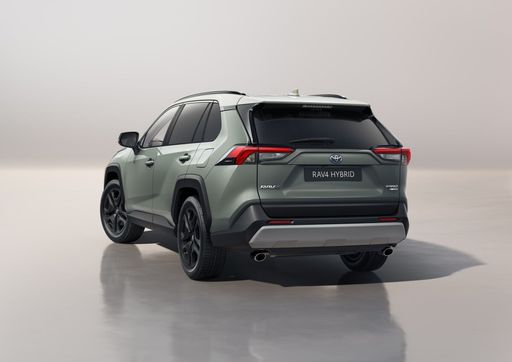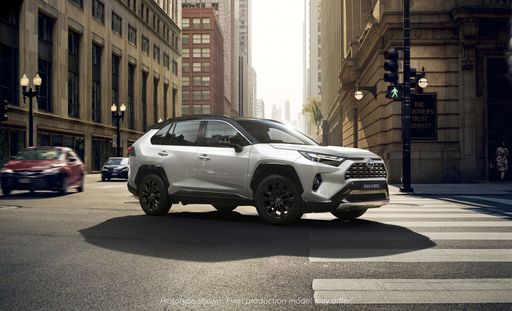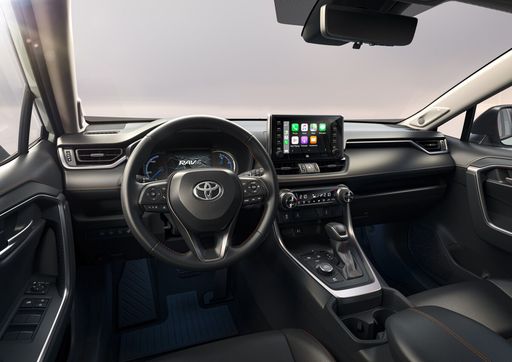Hyundai Kona vs Toyota RAV4 - Differences and prices compared
Compare performance (218 HP vs 306 HP), boot space and price (23100 £ vs 35100 £ ) at a glance. Find out which car is the better choice for you – Hyundai Kona or Toyota RAV4?
Costs and Efficiency:
Price and efficiency are key factors when choosing a car – and this is often where the real differences emerge.
Hyundai Kona has a decisively advantage in terms of price – it starts at 23100 £ , while the Toyota RAV4 costs 35100 £ . That’s a price difference of around 12077 £.
Fuel consumption also shows a difference: Toyota RAV4 manages with 1 L and is therefore clearly more efficient than the Hyundai Kona with 4.60 L. The difference is about 3.60 L per 100 km.
As for electric range, the Hyundai Kona performs decisively better – achieving up to 514 km, about 439 km more than the Toyota RAV4.
Engine and Performance:
Under the bonnet, it becomes clear which model is tuned for sportiness and which one takes the lead when you hit the accelerator.
When it comes to engine power, the Toyota RAV4 has a evident edge – offering 306 HP compared to 218 HP. That’s roughly 88 HP more horsepower.
In acceleration from 0 to 100 km/h, the Toyota RAV4 is evident quicker – completing the sprint in 6 s, while the Hyundai Kona takes 7.80 s. That’s about 1.80 s faster.
In terms of top speed, the Hyundai Kona performs slightly better – reaching 210 km/h, while the Toyota RAV4 tops out at 180 km/h. The difference is around 30 km/h.
Space and Everyday Use:
Cabin size, boot volume and payload all play a role in everyday practicality. Here, comfort and flexibility make the difference.
Both vehicles offer seating for 5 people.
In curb weight, Hyundai Kona is distinct lighter – 1370 kg compared to 1745 kg. The difference is around 375 kg.
In terms of boot space, the Toyota RAV4 offers to a small extent more room – 580 L compared to 466 L. That’s a difference of about 114 L.
In maximum load capacity, the Toyota RAV4 performs distinct better – up to 1690 L, which is about 390 L more than the Hyundai Kona.
When it comes to payload, Toyota RAV4 somewhat takes the win – 600 kg compared to 490 kg. That’s a difference of about 110 kg.
Who wins the race in the data check?
The Toyota RAV4 is clearly superior overall in the objective data comparison.
This result only shows which model scores more points on paper – not which of the two cars feels right for you.
Costs and Consumption
View detailed analysis
Engine and Performance
View detailed analysis
Dimensions and Body
View detailed analysis

Toyota RAV4
Hyundai Kona
The Hyundai Kona wears its personality on the outside with bold styling and sprightly handling that turns city driving into something a little more fun than a commute. It blends practical space, modern tech and sensible running costs into a compact, stylish package — a smart pick if you want flair without paying luxury prices.
details



Toyota RAV4
The Toyota RAV4 feels like a sensible friend on the road, marrying dependable practicality with a dash of SUV personality that keeps daily driving from turning dull. Comfortable and easy to live with, it looks tough without shouting and quietly gets the job done — a sensible pick for buyers who want versatility without drama.
details



Costs and Consumption |
|
|---|---|
|
Price
23100 - 41600 £
|
Price
35100 - 55700 £
|
|
Consumption L/100km
4.6 - 7 L
|
Consumption L/100km
1 - 5.6 L
|
|
Consumption kWh/100km
14.6 - 16.8 kWh
|
Consumption kWh/100km
-
|
|
Electric Range
377 - 514 km
|
Electric Range
75 km
|
|
Battery Capacity
1.3 - 65.4 kWh
|
Battery Capacity
-
|
|
co2
0 - 163 g/km
|
co2
22 - 128 g/km
|
|
Fuel tank capacity
38 - 47 L
|
Fuel tank capacity
55 L
|
Dimensions and Body |
|
|---|---|
|
Body Type
SUV
|
Body Type
SUV
|
|
Seats
5
|
Seats
5
|
|
Doors
5
|
Doors
5
|
|
Curb weight
1370 - 1773 kg
|
Curb weight
1745 - 1910 kg
|
|
Trunk capacity
466 L
|
Trunk capacity
520 - 580 L
|
|
Length
4350 - 4385 mm
|
Length
4600 mm
|
|
Width
1825 mm
|
Width
1855 mm
|
|
Height
1580 - 1585 mm
|
Height
1685 mm
|
|
Max trunk capacity
1300 L
|
Max trunk capacity
1604 - 1690 L
|
|
Payload
420 - 490 kg
|
Payload
390 - 600 kg
|
Engine and Performance |
|
|---|---|
|
Engine Type
Electric, Petrol, Full Hybrid
|
Engine Type
Full Hybrid, Plugin Hybrid
|
|
Transmission
Automatic, Manuel
|
Transmission
Automatic
|
|
Transmission Detail
Reduction Gearbox, Manual Gearbox, Dual-Clutch Automatic
|
Transmission Detail
CVT
|
|
Drive Type
Front-Wheel Drive, All-Wheel Drive
|
Drive Type
Front-Wheel Drive, All-Wheel Drive
|
|
Power HP
115 - 218 HP
|
Power HP
218 - 306 HP
|
|
Acceleration 0-100km/h
7.8 - 11.9 s
|
Acceleration 0-100km/h
6 - 8.4 s
|
|
Max Speed
162 - 210 km/h
|
Max Speed
180 km/h
|
|
Torque
200 - 265 Nm
|
Torque
-
|
|
Number of Cylinders
3 - 4
|
Number of Cylinders
4
|
|
Power kW
85 - 160 kW
|
Power kW
160 - 225 kW
|
|
Engine capacity
998 - 1598 cm3
|
Engine capacity
2487 cm3
|
General |
|
|---|---|
|
Model Year
2024 - 2025
|
Model Year
2024 - 2025
|
|
CO2 Efficiency Class
A, D, C, E, F
|
CO2 Efficiency Class
D, B
|
|
Brand
Hyundai
|
Brand
Toyota
|
Is the Hyundai Kona offered with different drivetrains?
Available configurations include Front-Wheel Drive or All-Wheel Drive.




